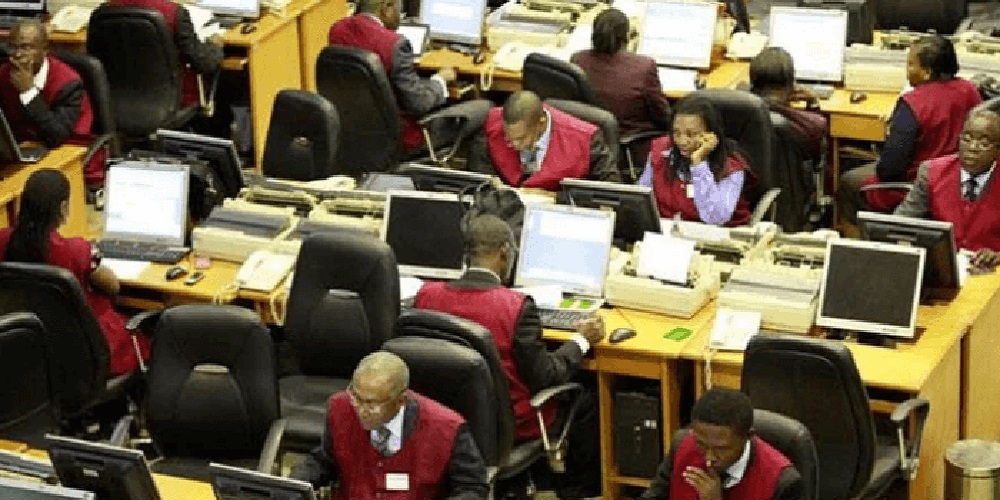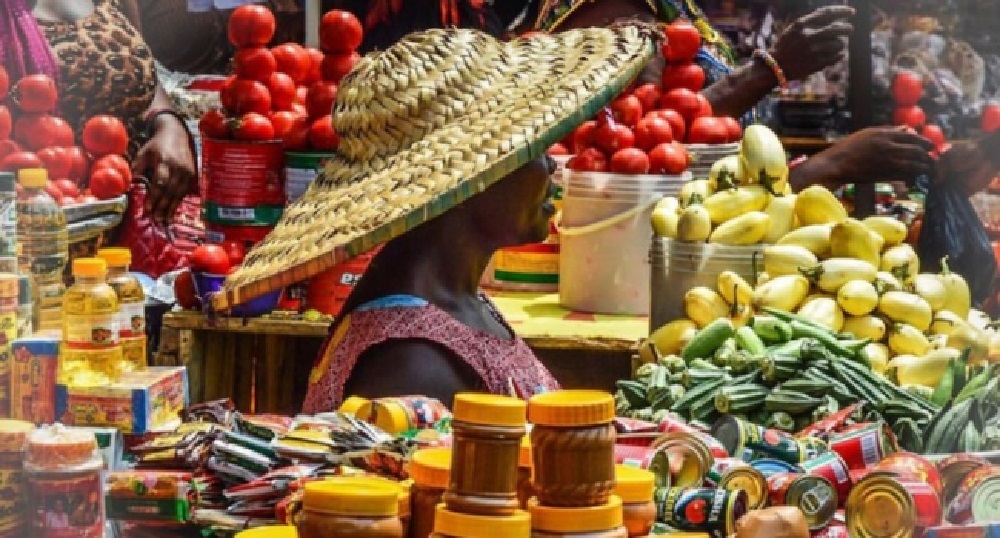Economy
Weekly Report: Equity Market Loses N1.32trn amid CBN Rate Hike

Equity investors on the Nigerian Exchange Ltd. (NGX) experienced a significant loss of N1.32 trillion in the just concluded week.
The downward performance was driven by selloffs in Tier-one banking stocks namely: Zenith Bank, Guaranty Trust Holding Company (GTCO), and also Dangote Cement, Dangote Sugar, African Prudential, among others.
Specifically, investors reacted negatively to the Central Bank of Nigeria’s (CBN’S) hike in the Monetary Policy Rate (MPR) announced within the week.
The News Agency of Nigeria (NAN) reports that CBNs Monetary Policy Committee (MPC) on Tuesday announced another increase in the country’s MPR by 50 basis point to 26.75 per cent, from 26.25 per cent.
Dr. Yemi Cardoso, CBN Governor, said the decision was in response to the continued inflationary pressures.
He noted that it was important to deal with inflation, as the apex bank was concerned over the impact of the inflation on ordinary Nigerians and businesses.
The NGX) All-Share Index and Market Capitalisation depreciated by 2.33 per cent each to close the week at 98,201.49 and N55.605 trillion respectively, against 100,539.40 and N56.929 trillion posted in the previous week.
Similarly, all other indices finished lower with the exception of NGX MERI Value which appreciated by 0.72 per cent while the NGX ASeM and NGX Sovereign Bond indices closed flat.
Also, 20 equities appreciated in price during the week, lower than 37 equities in the previous week.
Forty-seven equities depreciated in price, higher than 34 in the previous week, while 84 equities remained unchanged, higher than 80 recorded in the previous week.
Secure Electronic Technology Plc led 46 declined equities on the losers’ table by 26.32 per cent to close at 42k per share.
Sovereign Trust Insurance Plc led 19 other advanced equities on the gainers table by 14.29 per cent to close at 56k per share.
Meanwhile, a total turnover of 3.557 billion shares worth N47.220 billion in 42,871 deals was traded during the week by investors.
This is in contrast to a total of 2.827 billion shares valued at N42.366 billion that exchanged hands last week in 44,277 deals.
The Financial Services Industry measured by volume led the activity chart with 2.011 billion shares valued at N25.783 billion traded in 24,350 deals.
This contributed 56.52 per cent and 54.60 per cent to the total equity turnover volume and value respectively.
The Services industry followed with 1.020 billion shares worth N3.216 billion in 1,846 deals.
The third place was the Agriculture industry, with a turnover of 168.028 million shares worth N647.859 million in 1,473 deals.
Trading in top three equities namely: Tourist Company of Nigeria Plc, FCMB Group Plc and Abbey Mortgage Bank Plc measured by volume accounted for 1.876 billion shares worth N8.511 billion in 935 deals.
This contributed 52.73 and 18.02 per cent to the total equity turnover volume and value respectively.
Looking ahead to the coming week, Analysts at Cowry Asset Management Ltd., predicted that bearish trend is expected to persist.
The analysts said this is because market players would continue to digest the outcome of the recently published economic data and the interest rate hike by the apex bank.
They noted that the continued rise in yield levels within the fixed income and money market spaces is likely to maintain the unattractiveness of equities, as investors opt for the appealing yields.
“Nonetheless, a mildly positive performance is anticipated on the back of continued earnings releases and attractive dividend declarations by corporations in the coming week.
“As the market structure and fundamentals evolve, investors are advised to position themselves in stocks with sound fundamentals to navigate the prevailing conditions effectively,” the analysts stated.
(NAN)
Economy
Volvo announces termination of 800 U.S. workers, cites tariff, market decline

Volvo Group has announced plans to lay off up to 800 workers at three of its U.S. facilities over the next three months, citing ongoing market uncertainty and declining demand exacerbated by tariffs introduced under the administration of President Donald Trump.
The affected locations include the Mack Trucks plant in Macungie, Pennsylvania, as well as Volvo Group sites in Dublin, Virginia, and Hagerstown, Maryland.
In a statement on Friday, Volvo Group North America confirmed that between 550 and 800 employees would be impacted.
The company, a subsidiary of Sweden’s AB Volvo, employs nearly 20,000 people across North America.
The layoffs come amid wider turmoil in the automotive and manufacturing sectors, as shifting U.S. trade policy and a series of tariffs continue to drive up production costs. Economists have pointed to the uncertainty surrounding Trump’s trade strategy as a factor undermining both business and consumer confidence, with concerns mounting over a potential economic slowdown or recession.
According to Volvo, the company is grappling with a decline in heavy-duty truck orders, driven by instability in freight rates, anticipated regulatory changes, and the growing financial burden of tariffs. “We regret having to take this action, but we need to align production with reduced demand for our vehicles,” a company spokesperson stated in an email quoted by Reuters.
Volvo’s announcement marks another blow to an industry already navigating a complex web of supply chain challenges and fluctuating market conditions, with other manufacturers also warning of potential cost hikes and disruptions tied to global trade disputes.
Economy
Inflation surged to 24.23% due to escalating cost of living

Inflationary pressure has reappeared as Nigerians grapple with increases in average costs of basic food items and energy.
For the first time after the rebasing of the Consumer Price Index (CPI), headline inflation spiked in March to 24.23 per cent – 105 basis points above the 23.18 per cent recorded in the previous month.
The National Bureau of Statistics (NBS) yesterday indicated that the rate of increase in the average price level was higher in March than the level in February.
In January, the NBS updated the weight and price reference periods in calculation of the CPI to make the inflationary gauge more reflective of changes in consumption patterns and the economy generally.
The rebasing did not only brought the base year closer to the current period from 2009 to 2024, it also introduced some critical methodology changes to improve the computation processes.
After the rebasing, inflation dropped from 34.80 per cent in the pre-rebased period of December 2024 to 24.48 per cent in January 2025. It dropped further to 23.18 per cent in February.
In its latest report, NBS recorded 186 basis points changes between the monthly inflation rate, with the month-on-month rate rising from 2.04 per cent in February to 3.90 per cent in March.
The NBS attributed the spike to the rise in costs of food and alcoholic beverages, fuels and electricity, among other items.
Analysts at CardinalStone said the resurgence was due to renewed foreign exchange (forex) pressures amid heightened global risk-off sentiment.
They pointed at foreign portfolio investments (FPIs) outflows and increased dollar demand, which saw naira dropping by 2.4 per cent in March.
Experts also cited increase in price of Premium Motor Spirit (PMS) or petrol, following the temporary suspension of the naira-for-crude swap arrangement.
Food inflation rate stood at 21.79 per cent in March 2025. The composite food index decreased to 21.79 per cent from 23.51 per cent.
Core inflation, which excludes volatile agricultural produce prices and energy, rose to 24.43 per cent from 23.01 per cent.
Specifically, the month-on-month food inflation rose by 50 basis points from 1.67 per cent in February to 2.18 per cent in March.
The NBS attributed the increase in food inflation to increases in the average prices of basic food items including ginger, garri, broken rice, honey, crabs, potatoes, plantain flour, periwinkle and pepper amongst others.
On a state-by-state basis, food inflation was higher in Oyo with 34.41 per cent; Kaduna (31.14 per cent) and Kebbi (30.85 per cent).
On the other side, the 9.61 per cent recorded by Bayelsa; Adamawa (12.41 per cent) and Akwa Ibom (12.60 per cent), were the lowest inflation rates.
Analysts expressed concerns that the resurgent inflationary pressure might lead to renewed tightening stance by the Central Bank of Nigeria (CBN).
CBN Governor Dr. Olayemi Cardoso, had at the end of the first Monetary Policy Committee (MPC) meeting in 2025, reiterated the apex bank’s commitment to orthodox monetary policies, noting that the apex bank’s stance will be reflective of the inflationary trend.
With inflation rate dropping in February, the MPC had decided to maintain all key monetary policy parameters, including the Monetary Policy Rate (MPR) at 27.50 per cent, the asymmetric corridor around the MPR at +500/-100 basis points, the Cash Reserve Ratio (CRR) at 50.00 per cent for Deposit Money Banks and 16.00 per cent for Merchant Banks, and the Liquidity Ratio at 30.00 per cent.
Clarifying the impact of the rebased CPI, Cardoso had explained that the lower inflation figure should not be misinterpreted.
He underlined the need to analyse more data before drawing comparisons, noting that the CBN is currently assessing the figures and will provide further guidance in due course.
The CBN boss stressed the critical importance of collaboration between monetary and fiscal authorities in sustaining recent economic improvements.
Addressing concerns about the impact of elevated borrowing costs on economic growth, the CBN governor assured that the apex bank’s primary objective is to stabilize the foreign exchange and financial markets.
He expressed confidence that such stability would attract increased foreign investments, stimulating the much-needed economic growth.
Cardoso also highlighted the competitiveness of the Nigerian currency, which has spurred growing interest from international investors.
Economy
SEE Current Black Market Dollar (USD) To Naira (NGN) Exchange Rate

The exchange rate between the US dollar and the Nigerian naira continues to draw significant attention from individuals and businesses alike, especially those involved in international trade and remittances.
On Saturday, April 12, 2025, activity in the Lagos parallel market, commonly known as the black market shows that the buying rate for one US dollar stands at ₦1570, while the selling rate is ₦1575.
These figures are sourced from traders and Bureau De Change (BDC) operators who are active in key currency exchange hubs across Lagos.
Why the Black Market Rate Matters
Although the Central Bank of Nigeria (CBN) does not officially recognize or support the use of the black market for foreign exchange transactions, many Nigerians still rely on it due to difficulties in accessing forex through official banking channels. Issues such as limited availability, long processing times, and strict documentation requirements have made the black market a more accessible, albeit riskier, alternative.
CBN’s Official Position
The CBN continues to warn against participating in parallel market trading, stating that such activities undermine the stability of the national currency. The apex bank urges those in need of foreign currency to apply through authorized financial institutions, which are mandated to follow official exchange rates.
Nonetheless, the disparity between the official and unofficial markets persists, often influenced by market forces such as demand, inflation, and fluctuations in Nigeria’s foreign reserves.
Latest Exchange Rates Overview
Black Market (Parallel Market) Rate
Currency Pair Buying Rate Selling Rate
USD/NGN ₦1570 ₦1575
CBN Official Rate
Currency Pair Highest Rate Lowest Rate
USD/NGN ₦1630 ₦1570
Key Notes for Forex Users
The exchange rates in the black market often differ slightly from one location or dealer to another due to market volatility and negotiation margins.
Rates can also fluctuate within hours based on economic news, government policies, and global financial trends.
It is advisable to compare rates from multiple sources before conducting any large transactions, especially in volatile markets.
What This Means for Nigerians
The current forex rates reflect continued pressure on the naira, and many analysts believe that inflation, reduced oil revenue, and inconsistent monetary policies are key factors driving the demand for the dollar. For everyday Nigerians, this means the cost of imported goods remains high, and businesses dependent on international suppliers face growing challenges.
Until forex supply stabilizes through official channels, the black market will likely remain a major player in Nigeria’s currency landscape.
-

 News21 hours ago
News21 hours agoDouble tragedy: Father, three children, maid killed in Osun road crash
-

 News21 hours ago
News21 hours agoSAD! SEC DG says “we can’t recover N1.3trn Nigerians lost to CBEX ponzi scheme”
-

 News19 hours ago
News19 hours agoNDLEA nabs bandits supplier with drugs concealed in private part(Photos)
-

 News11 hours ago
News11 hours agoIsrael’s remote controlled bulldozers breaking ground in Gaza war
-

 Sports14 hours ago
Sports14 hours agoBREAKING! Arsenal hammer relegation Bound Ipswich 4-0
-

 News11 hours ago
News11 hours ago70-hour Chess Marathon: Onakoya reportedly breaks record set by Norwegians
-

 News20 hours ago
News20 hours agoNUJ-FCT Chairman Urges Journalists to Embrace Spirit of Easter
-

 Sports13 hours ago
Sports13 hours agoEPL Results: Chelsea Boost UCL Hopes, Arsenal Win Big, Man United Lost






